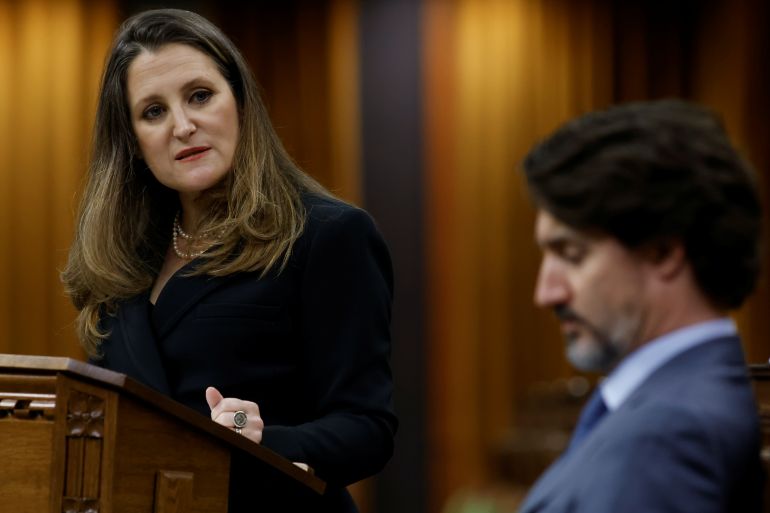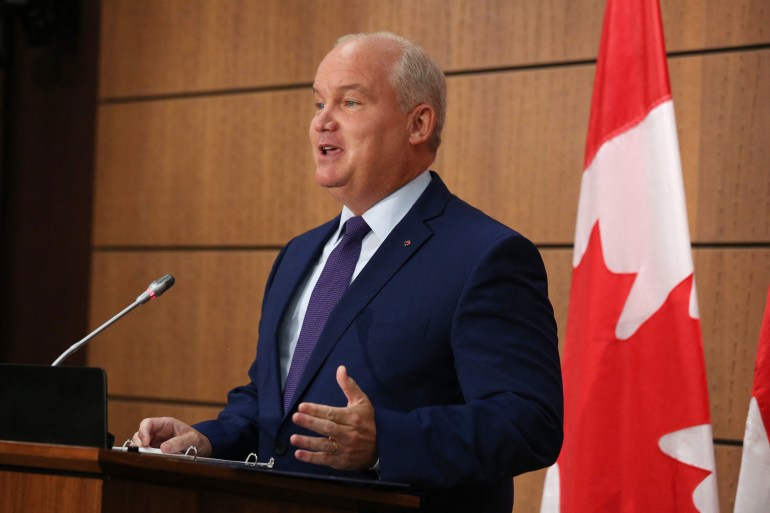Canada’s new budget sets aside billions for pandemic support
Amid surging third wave, Trudeau government unveils first budget in two years with focus on COVID-19 recovery measures.

Canadian Prime Minister Justin Trudeau’s government has unveiled a new budget that allocates billions of dollars to coronavirus-related support and stimulus measures, as the country struggles to contain a surging third wave of the pandemic.
Speaking in the House of Commons in Ottawa on Monday afternoon, Finance Minister Chrystia Freeland said the budget allocates $80.9bn ($101.4bn Canadian) over three years to help boost the economy.
Keep reading
list of 4 itemsIs the US safe for refugees? Canada’s top court could soon decide
As COVID rages in Canada, Atlantic provinces set model to follow
Ontario’s COVID crisis: ‘This scenario was entirely preventable’
Of the nearly $39.9bn ($50bn Canadian) in new spending this year, more than half will go to extending coronavirus recovery measures, including wage and rent subsidies, as well as to a new programme to help companies begin hiring workers again.
Another $23.9bn ($30bn Canadian) over five years will help set up a nationwide childcare system in cooperation with Canadian provinces.
This budget is about finishing the fight against COVID. It’s about healing the economic wounds left by the COVID recession. And it’s about creating more jobs and prosperity for Canadians in the days – and decades – to come.
— Chrystia Freeland (@cafreeland) April 19, 2021
Freeland defended the budget price tag, saying Canadians are struggling due to COVID-19 and need support, while promising a return to more restrained spending once the pandemic is under control.
“Some will say our sense of urgency is misplaced. Some will say that we’re spending too much. To them, I say this: Did you lose your job during a COVID lockdown?” she said from the floor of the parliament.
“Our country cannot prosper if we leave hundreds of thousands of Canadians behind.”
Canada is experiencing a surging third wave of the pandemic, with healthcare workers in the largest province, Ontario, sounding the alarm over rapidly rising infections and intensive care admissions.
Canada’s deficit for the fiscal year that started on April 1 will be the second largest in recent decades, with the closely watched debt-to-GDP (gross domestic product) ratio hitting 51.2 percent.
Daniel Beland, a professor at McGill University in Montreal and director of the McGill Institute for the Study of Canada, said in a statement that Monday’s budget “is perhaps the most important federal budget in a generation”.

“We have never witnessed a longer gap between two federal budgets since 1867,” he said.
Canada is widely believed to be heading towards a federal election, which could be called later this year, and Beland said the Trudeau government “is likely to use this budget as a key source of pledges for its next electoral platform”.
Jagmeet Singh, leader of the left-leaning New Democratic Party, criticised the budget for not guaranteeing that the “the ultra-rich” pay for the pandemic. “What Justin Trudeau is saying is that workers and families are going to have to pay the price,” he told reporters.
Before the announcement, Singh had said he hoped to see improved access to paid sick leave, as many workers on the front lines of the COVID-19 crisis are getting sick. “We know that people are getting sick at work, and we know that workplaces are the highest risks of transmission. Workers are getting sick and bringing that back to their families,” he said.
He also said the NDP hoped the federal government would use emergency regulations to help Ontario tackle its COVID-19 crisis. Singh released a letter earlier on Monday asking Trudeau to invoke Canada’s Emergencies Act to help distribute vaccines and provide paid time off for workers.

Conservative Party leader Erin O’Toole, for his part, said: “Canadians were expecting a pandemic budget. This is an election budget – and a poor one, at that.”
Speaking to reporters after the budget was released, O’Toole blamed Trudeau for the surging third wave of the pandemic and said the budget will do little to tackle the virus. “Unfortunately, this budget does next to nothing to secure the Canadian economy,” he said.
Canada has offered financial support to Canadian employers to help them pay employee salaries through what it dubbed the Canada Emergency Wage Subsidy, while also providing other direct emergency support for unemployed or under-employed Canadians.
More than 23,600 people have died due to the coronavirus in Canada, according to data from Johns Hopkins University, while at least 1.13 million cases have been reported.